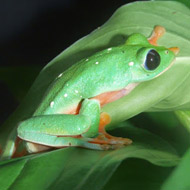
BIAZA release list of species staving off extinction thanks to the help of zoos
The British and Irish Association of Zoos and Aquariums (BIAZA) has compiled a top 10 list of reptiles and amphibians benefitting from the help of its members throughout the UK and Ireland.
The list, which includes the ploughshare tortoise and the golden mantella, features some of the best examples of how zoos and aquariums are protecting the future of wildlife and their habitats across the world.
Dr Andrew Marshall, of BIAZA's field programmes committee, who co-ordinated the compilation of the list, said: "Zoos are part of a global conservation community. Last year, BIAZA published a report on the top 10 mammals most reliant on zoos, which highlighted the work being done by zoos to help safeguard their future. This year, we have focused on 10 prevailing examples of reptiles and amphibians that zoos are working to save from extinction."
The list includes species that are facing a drastic decline, leaving them in a desperate situation in the wild.
The komodo dragon is the largest living lizard, with males growing up to three metres in length and females can, if necessary, reproduce on their own. However, there are today less than 1,000 left in the wild.
The morelet's leaf frog has incredible jet black eyes, with no discernible iris, and wide webbing between its toes which allows it to parachute between trees. However, these striking lime-green frogs are rapidly disappearing as their forest habitats are destroyed.
In addition to demonstrating the importance of zoos and aquariums for conservation breeding of safety-net populations, the list also demonstrates their contribution to funding and management of conservation projects in the field. These include protection of crucial wildlife habitats, research, education and support for local communities.
The top 10 were selected from strict criteria. The reptiles and amphibians put forward had to be connected to current field initiatives and conservation breeding in zoos. Priority was also given to species listed as threatened on the international IUCN Red List of threatened species. Initiatives which included a management role in the species’ conservation were also given specific importance.
In alphabetical order, BIAZA's top 10 reptile and amphibians most reliant on zoos are:
Axolotl
Golden mantella
Komodo dragon
Lemur leaf frog
Morelet's leaf frog
Mountain chicken
Orange-tailed skink
Ploughshare tortoise
Round island boa
Sand lizard
The full report, The top ten reptiles and amphobians benefitting from zoos, is available to view here.
Image (C) Ben Baker, Chester Zoo.



 The latest
The latest